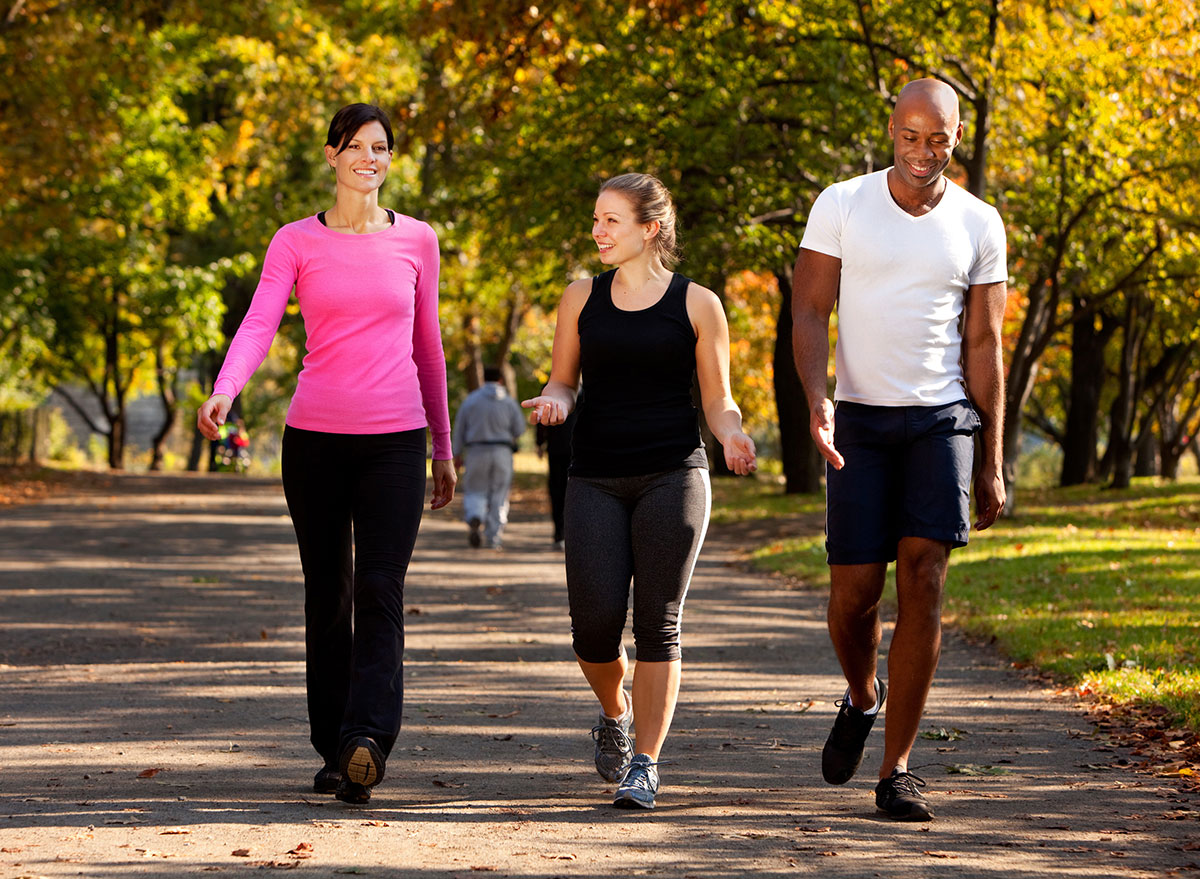One Walking Strategy That Will Secretly Make You a Happier Person

You’d be hard-pressed to find an easier way to elevate your health—and extend your life—than adding some steps to your days. Walking more does everything from bolstering your heart to helping you get slim to even boosting your mood. In the case of the latter, one notable study published the scientific journal Emotion found that going for a walk can improve your mood and increase your energy levels—even if you’re expecting to feel worse afterwards.
But if you’re looking to really boost your mood—and to view the world in a much more positive light—walking can help you out there, too. You just need to employ one specific mental technique devised by researchers at Iowa State University and published in the Journal of Happiness Studies. Read on for the secret trick that can help you walk your way to a happier existence. And if you’re someone who loves to walk, make sure you’re aware of The Secret Cult Walking Shoe That Walkers Everywhere Are Totally Obsessed With.
Bring on the “Loving-Kindness”

For the study, the researchers asked college students to employ one of four mental techniques while walking around a building for 12 minutes:
The “loving-kindness” technique: These students were instructed to only think positive, well-intentioned thoughts about the people they noticed while walking around. While it was impossible to guarantee sincerity, study authors encouraged participants to truly believe in what they were thinking. For example, “I wish for this person to be happy.”
The interconnectedness technique: This group was told to look at others and ponder how we’re all connected, and imagine that they have similar hopes, dreams, fears, and interests.
The downward social comparison technique: This portion of participants were told to look down on others and consider how they’re better off than everyone else.
And the control group: Finally, this group served as a comparison point for the other groups. These students were instructed to focus only on the physical appearances of others (clothing, style, makeup, etc).
Before and after each participant went for the 12-minute walk, study authors conducted surveys on anxiety, happiness, stress, empathy and connectedness levels. Once all that was completed, the research team compared the feelings of the first three experimental groups with the fourth control group. And for more on the benefits of walking, see here for The Secret Little Exercise Tricks That Will Extend Your Life.
You Guessed it: Nicer Thoughts Win Out

The results were striking, to say the least. The students who had been assigned to the loving-kindness group felt much less anxiety and more happiness, empathy, caring feelings, and interconnectivity. Similarly, participants within the interconnectedness group were more empathetic and connected.
Meanwhile, subjects who had compared themselves to—and looked down on—others showed zero benefits in reference to the control group. In fact, they reported feeling significantly worse all around. Students placed in the downward social comparison group felt more isolated, less empathetic, and less caring.
“Walking around and offering kindness to others in the world reduces anxiety and increases happiness and feelings of social connection,” says study co-author Douglas Gentile, Ph.D., professor of psychology at ISU. “It’s a simple strategy that doesn’t take a lot of time that you can incorporate into your daily activities.”
While these findings are based on a walk through a building, there’s nothing indicating the same wouldn’t hold true while out and about on a stroll through a park, or any setting where you may encounter other people for that matter.
It Works for Literally Everyone

Researchers also considered if certain personalities would benefit from one strategy more than another. They had speculated that more narcissistic personalities would have a hard time wishing others well, or perhaps more mindful individuals may benefit more from the loving-kindness strategy. Surprisingly, little differences were noted between personality types. “This simple practice is valuable regardless of your personality type,” comments study co-author Lanmiao He, a graduate student at ISU when this research was conducted. “Extending loving-kindness to others worked equally well to reduce anxiety, increase happiness, empathy and feelings of social connection.”
Remember: Comparison Is Competition

It’s human nature to compare ourselves to others, but study authors conclude comparison is almost always detrimental when it comes to well-being. When we look for weaknesses in others, or just focus on physical aspects like clothes and looks, it can turn something as simple as a walk into a contest or competition.
“At its core, downward social comparison is a competitive strategy,” explains study co-author Dawn Sweet, Ph.D., senior lecturer in psychology at ISU. “That’s not to say it can’t have some benefit, but competitive mindsets have been linked to stress, anxiety and depression.”
So the next time you’re tempted to laugh at someone with a bad haircut while out for a stroll, instead focus on how much you hope that person lives a long, happy life (including finding a better barber). Injecting some genuine kindness into your walks may be the secret ingredient you’ve been searching for to bring some more happiness to your days. And for more walking tips, see these Secret Tricks for Walking for Exercise, According to Walking Experts.








